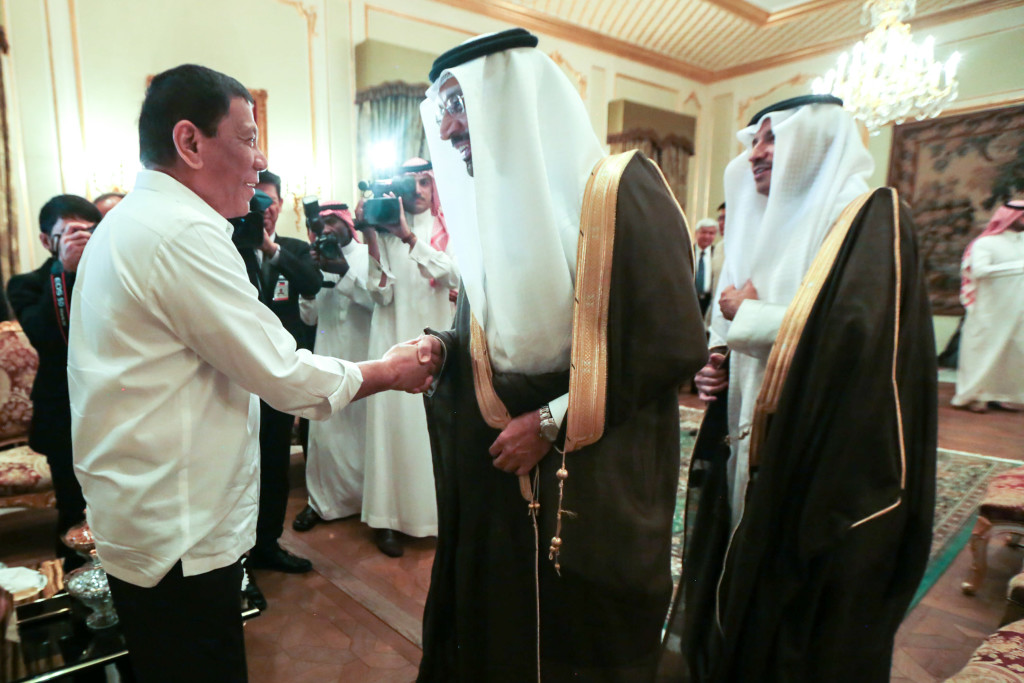Duterte felt no discrimination in Middle East, but…

President Rodrigo Duterte meets with Kingdom of Saudi Arabia Minister of Culture and Media Adel Al-Toraifi in a courtesy call on the President at the King Saud Guest Palace in Riyadh on April 11, 2017. ALBERT ALCAIN/Presidential Photo
President Duterte on Monday called countries big on human rights as “bigots,” comparing them to the Middle Eastern nations he recently visited wherein he felt very much welcome.
“Ang, what really impressed me very much is that hindi sila, I could not sense any kind of discrimination. Wala masyadong akong nakita unlike ‘yung, itong the pretentious ones tsaka itong mga iba na loko-loko. Mahilig sa human rights. ‘Yun naman pala sila, mga bigots. We call it bigots,” President Duterte said in his speech, following his arrival from the Middle East.
Mr. Duterte did not mention any country by name, but he had always vented his ire on the United States and the European Union for criticizing his war against illegal drugs that has claimed the lives of nearly 8,000 drug suspects since he assumed the presidency in June last year.
Philippine Airlines (PAL) PR 001 touched down at 3:44 a.m. at the Ninoy Aquino International Airport (Naia) on Monday, carrying the President and his delegation from their visit to the Kingdom of Saudi Arabia, Qatar, and Bahrain.
There were 138 OFWs who arrived from Saudi Arabia earlier than the President, but unlike Duterte, they had a different story to tell.
Arlene Roa, a native of Negros Occidental, cried as she took her seat at the arrival area where she and her fellow repatriated workers were gathered to meet the President.
“I’m just happy that I’m able to come home,” she told the Inquirer.
The 38-year-old was a household worker in Saudi for five years. But her female employer became abusive after the woman’s husband died.
Roa said she was forced to abandon her work and became an illegal alien for nearly two years before she was able to seek solace at Bahay Kalinga, the halfway house for distressed Filipino women in Riyadh managed by the Department of Labor and Employment (DOLE).
She stayed there for two weeks and was able to avail of the Saudi government’s amnesty program for undocumented foreigners, called “A Nation Without Illegal Expatriates” campaign, which allows undocumented workers to return to their home countries within 90 days without risk of detention.
“I don’t want to return anymore,” Roa, a mother of three college-aged children, said.
She will try to put up a business instead.
Twenty-six-year old Eddie Beira, Jr., of Batangas province, said that he was a service crew waiter for two years but his employer was unable to get him a worker’s permit.
He stayed at the Estiraha, DOLE’s halfway house for men, for a month before taking the nine-hour plane ride home Monday.
President Duterte had nothing but praises for the Middle Eastern countries he visited.
“But what I have sensed especially eh doon, nirerespeto ang tao. At there might have been some incidents but it can happen anywhere. Overall, all things being equal, wala akong masabi sa mga bayan na binisita ko,” he said.
He noted that the Kingdom of Saudi Arabia was “a bit more regimented I would say because it is really, they follow… every direction sa Islam.”
“Pero ‘yung sa ibang states, especially Bahrain at Qatar, wala ‘yung parang talagang you can move around and you can talk and you can sense that there is really a little of the freedom that the citizens enjoy which is shared by everybody,” Mr. Duterte said.
Labor Sec. Silvestre Bello III told reporters that Kuwait and Saudi Arabia have always been a concern for household workers because these are where most of the abuses take place. JE